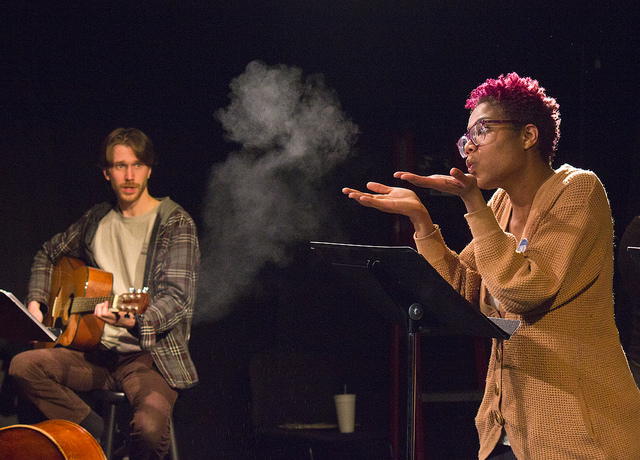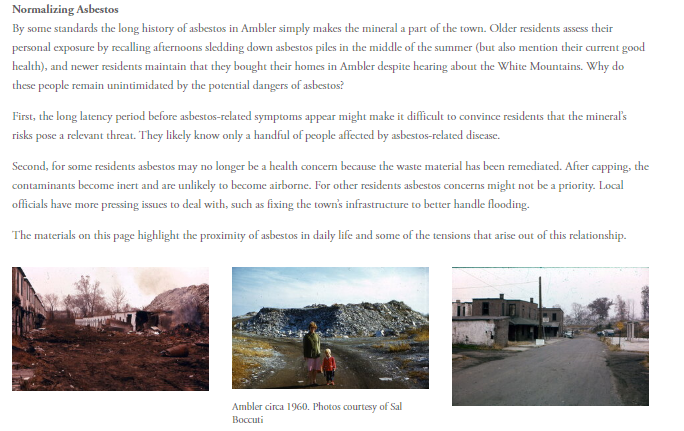2019 Faculty Seed Fund Sprouts and Shoots: Part 4
February 20, 2020
This is the fourth in a series of Field Notes focused on the work resulting from the 2019 Research and Teaching Seed Funds. These short posts offer a brief look at the second round of emergent initiatives in environmental humanities being developed by Penn faculty with support from PPEH seed funds. Each of the projects will also be featured in short presentations in February 2020 as a part of our Spring Brown Bag Series. Check out the schedule here!
Jump to Part 1
Jump to Part 2
Jump to Part 3
Living With Toxicity: Students Co-Creating New Public Engagement
Britt Dahlberg (History and Sociology of Science, Science History Institute), Nour Elkassabany (College Senior), and Zackary Biro (Science History Institute)
Beginning in the summer of 2017, the Center for Applied History (CAH) at the Science History Institute (prev. Chemical Heritage Foundation) has offered an annual seminar series called History Lab. These sessions, covering topics within broad themes like “Data” and “The Future” are meant to encourage discussions about science, how it is produced, how history has shaped it, and why it still matters today. This type of programming is distinct because it urges audiences to reconsider sometimes buried assumptions about science, including the idea of “expertise” and impulse to produce an “answer.”
The PPEH seed fund allowed Nour Elkassabany, a senior at the University of Pennsylvania, to join CAH in the summer of 2019 to help build the first iteration of a digital History Lab platform. She was previously in Dr. Britt Dahlberg’s “Toxicity in Context” class which explored some of Dahlberg’s work at the Science History Institute.
The intention to translate this in-person experience to an online space was borne out of the desire to make the materials available after each event takes place, contributing to the myriad goals of reaching new, different (geographically diverse!) audiences, allowing previous participants to revisit in greater depth, and attracting new potential participants to in-person programs.
Through a series of self-guided modules, users can not only think through some of the same questions we tackle in person, but also explore a wealth of online resources including oral histories and the Institute’s expanding digital collections. To meet the challenge of attempting to reap the benefits of in-person discussions on a digital platform, we offer a wealth of guiding questions, an exploratory narrative style, and a companion Facebook group that will be designated as a preliminary space to house further reflections.
The Digital History Lab modules for summer 2019 are based on the ongoing Science and Disability project and are largely shaped by visual literacy exercises. By presenting scientific instruments, educational materials such as chemistry sets for children, and documents accumulated in the process of scientific inquiry such as personal correspondence and book acknowledgements, audiences can begin to unpack the inclusionary and exclusionary practices embedded therein.
History Lab participants examining a 1940s colorimeter (Science History Institute)
The other portion of the pilot, History Lab Ambler, draws on CAH’s REACH Ambler project to capture the content of History Labs past. REACH Ambler culminated in a performance of the White Mountains, a series of plays based on community oral histories. The plays helped capture many of the dynamics of community based environmental history projects that we wanted to convey through the History Lab Ambler portion of the pilot. Its structure takes after the matrix of possibilities utilized in many “choose your own adventure” games, highlighting various perspectives on issues of identity and the legacy of asbestos as the town changes over time. History Lab Ambler joins past efforts like community theatre productions and student artworks as one of several ways the knowledge and interpretations generated by the initial project live on, continuing to prompt audiences to think about various definitions and intersections of home and risk.


